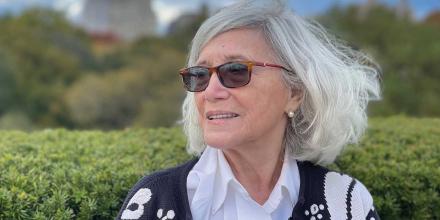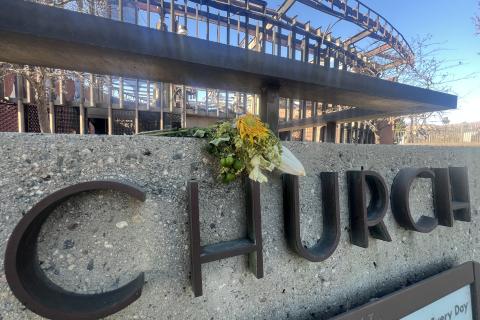Evi Blaikie was one of Hungary’s hidden children. She continues to speak up in favor of peace and caring.

Photo COURSEY OF EVI BLAIKIE
An adorable great granddaughter is both the greatest joy — and a sort of revenge — for Evi Blaikie, 82, Jewish, Hungarian and American. Evi is all of these: interpreter, fashion designer, environmentalist, writer, documentarian, teacher and philanthropist. She is also a Holocaust survivor.
“Nazis took my family, and I have created a new one. My life and what I did were in defiance of that, because we were not expected to live. We were not expected to thrive because of the Holocaust, first, and then in the orphanage.”
She shows photos of the newborn granddaughter as she talks about her struggle for survival, without losing her smile or joy. Evi is one of the Hidden Children, who managed to survive Nazi extermination because they were hidden in cellars and attics, or adopted by Christian families and institutions with false documents that saved their lives, although it also erased their religious identity and customs.
Born in Paris to Hungarian Jewish parents, Evi saw her father disappear into hiding because of his political beliefs after the German invasion in 1940. Going out to shop, Evi’s mother was caught in a roundup and sent to a forced labor camp. Realizing the danger of the situation, one of her aunts decided to take her back to Budapest, where other relatives lived. Not having a proper passport, Evi was disguised as a boy and passed off as her aunt’s son in order to cross the borders.
“In January 1944, I was 5 years old and the doorbell rang. My relatives opened the door and a very thin and small woman appeared in front of us. My aunt cries out: ‘Magda!’ It was my mother. She had managed to escape from the Austrian camp by walking through the woods for three weeks, guided only by sunlight.”
Evi has saved every detail of that day in her mind. Following the roundup of the Hungarian Jews in March 1944, her mother decided to escape to a small village farm. Evi, Peter, her older cousin, and Magda changed their names again and reinvented their religion, family and kinship.
The day of liberation was one of the scenes that remains indelible in Evi’s memory. “It was a frosty winter. Our farm was in the line of fire of the Allies, Nazis and Russians, with bombs and mortars that fell constantly. The cold forced us to stay in bed wrapped in blankets, because the Germans had taken the firewood.
“When the Russian soldiers arrived at night, with stolen decorated candles of a church, because they didn’t have any flashlights, we didn’t have any common language to explain our situation and to identify ourselves as Jewish. Then, my mom started reciting the most important Jewish prayer, ‘Shema Israel,’ and one Russian officer responded. That passage became our pass for life.”
Evi is still moved by remembering that moment.
When the war was over, Magda and Evi left for Paris, where she spent 2 years in a Jewish orphanage and 2 years later they went to London, and the little girl lived in an orphanage again because her mother worked hard and her father had died in Auschwitz.
“Those years after the war were very difficult for me, more than the war itself. During the war, I always had someone with me: my mother, my cousin and other fugitives. After the war, in the orphanage, I felt abandoned, and there was no one there to look after me,” Evi explains.
Yet in that context of abandonment, little Evi, with the other orphans, experienced the value of hope for the first time. “We were so miserable. We didn’t have family around, but we had each other, and we had dreams, so we made up stories. Some wanted to be movie stars; others a doctor, and we talked and talked about these children’s dreams. We will do these things; we will be out; we will travel: these were our stories. Dreaming was hopeful and kept us going on every single day. We didn’t know any other way.”
Some of them achieved those dreams. Others did not. Some became protagonists of the documentary Remember Us: The Hungarian Hidden Children, a choral story of all these children, now with white hair, that retrace their childhood as survivors. Evi is one of them. She decided to let herself be filmed in the cellars and dark rooms of Budapest, where she had lived as a fugitive, together with dozens of other invisibles.
The orphanage was a stepping stone for this hidden girl. She was accepted into a prestigious high school and from there she won a scholarship to the University of Vienna, where she studied as an interpreter, a profession that allowed her to travel to Venezuela and then to the U.S. in 1960.
Here she got married to an Irish Catholic, and their three children, five grandchildren and the new great-granddaughter became the gems of her life.
Evi is unstoppable in her will to live. She enjoys visiting museums, because “creativity makes the world better and more interesting. Seeing creative things, growing things, changing things makes me hope for something better to happen. Without that hope, you die and there is nothing.”
She is also the author of Magda’s Daughter, a passionate memoir depicting a life lived in the shadow of exile.
After her retirement, Evi started a new career: being an English teacher for dozens of immigrants and refugees at the ARNIC Center in New York. Her past makes it easy for her to empathize with their stories and their struggles, but also to empower them in looking with hope into the future.
Evi is also building a future of peace and harmony in Israel, she is a supporting of “Hand to Hand,” an NGO that pays public schools to hire a Palestinian teacher in order to get students together learning a new language and a different culture.
“We already have seven schools involved in the project, and I saw Palestinian and Israeli children growing up together, as trees of a new season,” says Evi proudly.
However, according to her, the most important thing she is doing now is to share her experience as a Holocaust survivor with schools, universities, associations. “People have to remember what happened. There are fewer and fewer of us that are left to talk. I read that 25% of Americans have never heard of the Holocaust, and I’m here to prove that it happened.”
What does she share with the students? “My message is always this: Be aware of what is going on around you, do what is right, and care. Don’t just live your life as if it were only for you. It’s always for other people. You have to be aware of what is happening, and you cannot ignore it, because when you do this, a Holocaust can happen again. You have to look out for your fellowmen and take care of them.”
And is there a place for faith after such a tragic experience? “I am deeply Jewish, but let’s say that God and I have some pending issues."













